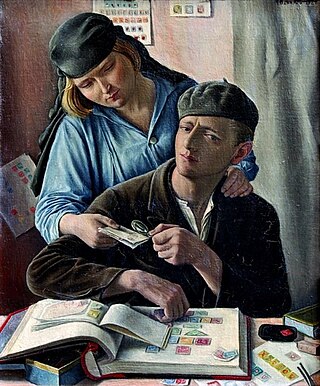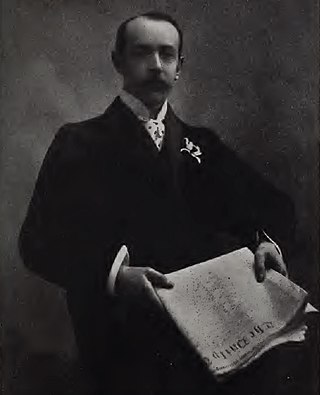Related Research Articles

Philately is the study of postage stamps and postal history. It also refers to the collection and appreciation of stamps and other philatelic products. While closely associated with stamp collecting and the study of postage, it is possible to be a philatelist without owning any stamps. For instance, the stamps being studied may be very rare or reside only in museums.

Stamp collecting is the collecting of postage stamps and related objects. It is an area of philately, which is the study of stamps. It has been one of the world's most popular hobbies since the late nineteenth century with the rapid growth of the postal service, as a stream of new stamps was produced by countries that sought to advertise their distinctiveness through their stamps.

Sir Edward Denny Bacon was a British philatelist who helped with the enlargement and mounting of collections possessed by rich collectors of his time and became the curator of the Royal Philatelic Collection between 1913 and 1938.

The postage stamps and postal history of Israel is a survey of the postage stamps issued by the state of Israel, and its postal history, since independence was proclaimed on May 14, 1948. The first postage stamps were issued two days later on May 16, 1948. Pre-1948 postal history is discussed in postage stamps and postal history of Palestine.

The Roll of Distinguished Philatelists (RDP) is a philatelic award of international scale, created by the Philatelic Congress of Great Britain in 1921. The Roll consists of five pieces of parchment to which the signatories add their names.
David Richard Beech MBE was the curator of the British Library Philatelic Collections from 1983–2013. He is a fellow and past president of the Royal Philatelic Society London (RPSL). In 2013, it was announced that Beech was to receive the Smithsonian Philatelic Achievement Award for outstanding lifetime accomplishments in the field of philately.
Mirosław Artur Bojanowicz was a Polish philatelist who settled in England after World War II and became a recognized expert on the stamps of Poland. He frequently served as a judge at international exhibitions and in 1966 was invited to sign the Roll of Distinguished Philatelists; Bojanowicz was one of very few professional philatelists to be accorded this honour.
Gilbert "Gillie" Harrison was an English philatelist, and rugby union footballer who played in the 1870s and 1880s. He was one of the "Fathers of Philately" entered on the Roll of Distinguished Philatelists in 1921.

The British Library Philatelic Collections is the national philatelic collection of the United Kingdom with over 8 million items from around the world. It was established in 1891 as part of the British Museum Library, later to become the British Library, with the collection of Thomas Tapling. In addition to bequests and continuing donations, the library received consistent deposits by the Crown Agency and has become a primary research collection for British Empire and international history. The collections contain a wide range of artefacts in addition to postage stamps, from newspaper stamps to a press used to print the first British postage stamps.

The Crawford Library is a library of early books about philately formed between 1898 and 1913 by James Lindsay, 26th Earl of Crawford. By the time of his death in 1913, Crawford was thought to have amassed the greatest philatelic library of his time. Today, the library is part of the British Library Philatelic Collections.

Alexander Berridge Kay was the founder, with E.J. Bridger, of the stamp dealers Bridger and Kay in 1897 or 1898 and a leading figure in the Fiscal Philatelic Society. In 1910, Kay identified used copies of the Italian forgery of the British grey-green Victorian 10 shilling stamp watermarked anchor and perforated 14. His letter to The London Philatelist, published in November 1910, warned the philatelic community of its existence.
The Davies Collection is a collection of Libyan revenue stamps from 1955 to 1969, formed from material from the Bradbury Wilkinson Archive, and presented to the British Library Philatelic Collections by John Neville Davies in 1992.

Walter Dorning Beckton was a British philatelist who signed the Roll of Distinguished Philatelists in 1921. He was a Manchester solicitor by profession in the firm of Hockin, Beckton & Hockin.

Martial Caillebotte (1853–1910) was a French photographer and composer who was also one of the "Fathers of Philately", entering the Roll of Distinguished Philatelists in 1921.

The Row Collection is a collection of philatelic material relating to Siam that forms part of the British Library Philatelic Collections. The collection covers the period 1883 to 1918 in 22 volumes. It is mainly of unused material with many blocks, and strong in the various provisional surcharges. It also includes some postal stationery and issues used in Kedah and Kelantan. It was formed by Harold Row and presented to the British Museum in 1919 by Row's mother, Mrs Eliza Row.
George Ginger was a British philatelist who signed the Roll of Distinguished Philatelists in 1934. Ginger was an expert on the stamps of Victoria and prominent in philatelic circles in Manchester.
Edward Chauncey Luard was a British planter in Demerara, British Guiana. He was influential among the planter community in British Guiana and was a member of the Court of Policy for East Demerara. He led the campaign to introduce a ballot into the colony's constitution in 1895.
Paul Skinner is a British philatelist and head curator of the Philatelic Collections at the British Library.
John Barefoot is a British philatelist, stamp dealer, and publisher, best known for his catalogues of revenue stamps which are known collectively as the "Barefoot catalogue".
References
- ↑ "The 'Harold Row' Collection of the Stamps of Siam" by Edward Denny Bacon in The London Philatelist , Vol. XXIX, February 1920, No. 338, pp. 24-25.
- ↑ The Row Collection. British Library, 2012. Retrieved 24 December 2012. Archived here.